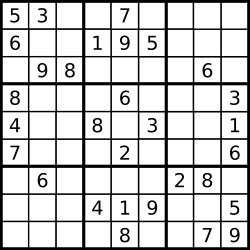判断一个 9x9 的数独是否有效。只需要根据以下规则,验证已经填入的数字是否有效即可。
- 数字
1-9在每一行只能出现一次。 - 数字
1-9在每一列只能出现一次。 - 数字
1-9在每一个以粗实线分隔的3x3宫内只能出现一次。

上图是一个部分填充的有效的数独。
数独部分空格内已填入了数字,空白格用 '.' 表示。
示例 1:
输入: [ ["5","3",".",".","7",".",".",".","."], ["6",".",".","1","9","5",".",".","."], [".","9","8",".",".",".",".","6","."], ["8",".",".",".","6",".",".",".","3"], ["4",".",".","8",".","3",".",".","1"], ["7",".",".",".","2",".",".",".","6"], [".","6",".",".",".",".","2","8","."], [".",".",".","4","1","9",".",".","5"], [".",".",".",".","8",".",".","7","9"] ] 输出: true
示例 2:
输入:
[
["8","3",".",".","7",".",".",".","."],
["6",".",".","1","9","5",".",".","."],
[".","9","8",".",".",".",".","6","."],
["8",".",".",".","6",".",".",".","3"],
["4",".",".","8",".","3",".",".","1"],
["7",".",".",".","2",".",".",".","6"],
[".","6",".",".",".",".","2","8","."],
[".",".",".","4","1","9",".",".","5"],
[".",".",".",".","8",".",".","7","9"]
]
输出: false
解释: 除了第一行的第一个数字从 5 改为 8 以外,空格内其他数字均与 示例1 相同。
但由于位于左上角的 3x3 宫内有两个 8 存在, 因此这个数独是无效的。
说明:
- 一个有效的数独(部分已被填充)不一定是可解的。
- 只需要根据以上规则,验证已经填入的数字是否有效即可。
- 给定数独序列只包含数字
1-9和字符'.'。 - 给定数独永远是
9x9形式的。
class Solution { public boolean isValidSudoku(char[][] board) { if(board == null || board.length == 0 || board[0].length == 0) return false; //3个HashSet, HashMap<Character,Integer>[] rMaps = new HashMap[9]; HashMap<Character,Integer>[] cMaps = new HashMap[9]; HashMap<Character,Integer>[] boxMaps = new HashMap[9]; for(int i = 0;i < 9;i++){ rMaps[i] = new HashMap<>(); cMaps[i] = new HashMap<>(); boxMaps[i] = new HashMap<>(); } // int m = board.length,n = board[0].length; for(int i = 0;i < 9;i++){ for(int j = 0;j < 9;j++){ char c = board[i][j]; if(c != '.'){ int boxIndex = (i / 3) * 3 + j / 3; rMaps[i].put(c,rMaps[i].getOrDefault(c,0) + 1); cMaps[j].put(c,cMaps[j].getOrDefault(c,0) + 1); boxMaps[boxIndex].put(c,boxMaps[boxIndex].getOrDefault(c,0) + 1); if(rMaps[i].get(c) > 1 || cMaps[j].get(c) > 1 || boxMaps[boxIndex].get(c) > 1){ return false; } } } } return true; } }